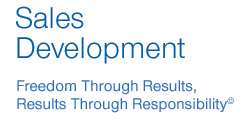I speak with hundreds of small business owners each month. Many have told me that they fear loss of control. If you are feeling the same, let’s take a look at some fundamental truths:
*Today, more than ever, it is vital to use time wisely and efficiently.
*The more we understand and take advantage of our strengths, the better our chances of success.
*Whining and complaining about things we cannot change will never help us regain control.
*Sometimes cuts are necessary, but you will never shrink yourself to Greatness.
*If your market has contracted, you will need to capture a greater market share to maintain the same level of sales revenue.
*If you have multiple competitors, an increase of just a few percentage points of market share can mean substantial increases in business. This can mean big $$$$ for you!
So a message to the wise—Don’t overlook the role of your Sales Force in turning around your organization.
When your competitor’s are reeling from economic chaos, there is excellent opportunity for you to exploit the situation, upgrade your sales team, and capture major market share. Here are just a few tips for managing your salespeople through the recession:
1. Change the Mindset. The change begins with YOU. Focus your thinking on Revenue Generation, not on cuts.
2. Understand what your salespeople are experiencing. They are likely feeling hammered. Hammered by more rejection. Hammered by longer Sales Cycles. Hammered by fewer leads. Hammered by the media predictions of doom and gloom. They are also likely being hammered by smaller commission checks and maybe even by increased pressure from you and or other sales managers. Note: Some pressure is good, but most salespeople will not perform at their best under intense pressure.
3. Shoot Straight with them. Don’t tell them everything is OK or “normal”. It’s not. The economy IS slow and it is likely that things will not get a whole lot better for at least 18 to 24 months. Let them know that things ARE tough out there and that you understand that many of them have NOT sold in this kind of environment before.
4. Give them the Solution. You can now outline the opportunity. Explain that the strong will not only survive, but that they will thrive. Then, explain the following realities:
- It is vital to adapt along with the changing economy.
- There will be tremendous opportunity for anyone who will focus and execute while weaker players are licking their wounds.
- Over-achievers will be rewarded handsomely.
- Over-achievement is expected in your company.
- Your company will provide coaching, training, encouragement and development. You will give them the support they need.
This is also a good time to ask your top performers to be team players and leaders. Let them know that you know they can do it and that doing so is part of over-achievement.
The greatest fortunes are made during turbulent economic times. Your Sales Force holds the key. Raise your expectations. Then raise theirs. Expect greatness, evaluate your sales team, and hold them accountable to over-achievement. Great results will follow….
Copyright © Joe Zente 2009. All Rights Reserved.
Bookmark the CEO Success Blog!










